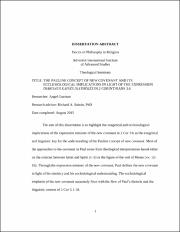The Pauline concept of new covenant and its ecclesiological implications in light of the expression Diakonus Kaines Diathekes in 2 Corinthians 3:6
Abstract
The aim of this dissertation is to highlight the exegetical and ecclesiological implications of the expression minister of the new covenant in 2 Cor 3:6 as the exegetical and linguistic key for the understanding of the Pauline concept of new covenant. Most of the approaches to the covenant in Paul come from theological interpretations based either on the contrast between letter and Spirit (v. 6) or the figure of the veil of Moses (vv. 12-16). Through the expression minister of the new covenant, Paul defines the new covenant in light of his ministry and his ecclesiological understanding. The ecclesiological emphasis of the new covenant accurately fixes with the flow of Paul’s rhetoric and the linguistic context of 2 Cor 3:1-18.
The methodology combines exegetical-historical analysis of the biblical text as well as the theological definition of the problem. In the first two chapters the historical positions, problems, current interpretations, challenges, and academic gaps of the problem investigation are presented. Then the next two chapters develop a wide exegetical analysis of the text and its context. The most basic context of the text is presented through the study of the covenant and new covenant in the Old Testament and Second Temple period literature. This deductive perspective of the background leads to the correct establishment of the Pauline frame of thought. The next chapter switches the emphasis to the inductive analysis of the passage within its New Testament and intertextual context. The investigation is made from the most important exegetical and linguistic flanks in order to have an objective result of the interpretation.
The main finding of the investigation is that Paul was not developing a doctrinal exposition about the new covenant in 2 Cor 3. He rather used several methaphorical and linguistic figures to define how the new covenant has affected his ministry and his definition of the church as people of God. Therefore, the main point of the passage is not what Paul said about the covenant, but what he said about his ministry and his ecclesiology using the Old Testament covenantal language.


